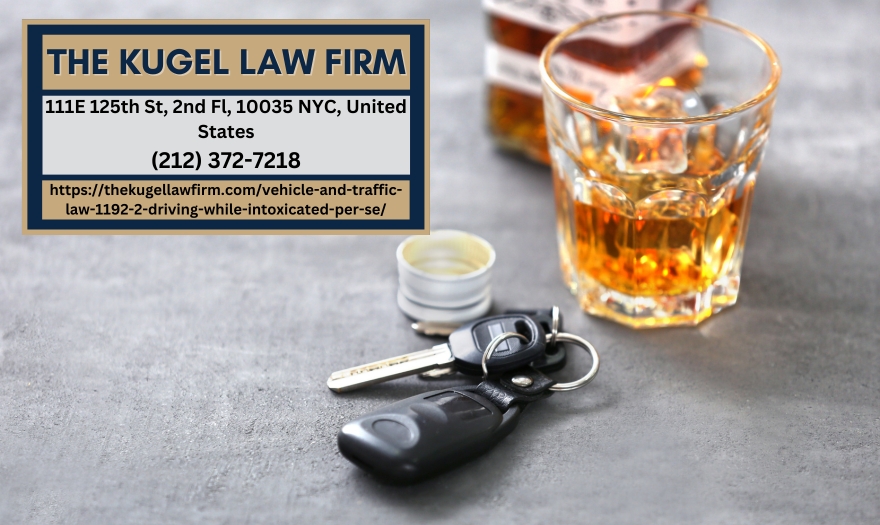New York DWI attorney Rachel Kugel (https://thekugellawfirm.com/vehicle-and-traffic-law-1192-2-driving-while-intoxicated-per-se/) is addressing a critical aspect of state law with her review of NY Vehicle and Traffic Law § 1192.2, also known as Driving While Intoxicated; Per Se. This statute targets individuals who operate motor vehicles with a blood alcohol concentration (BAC) of 0.08% or higher, as determined by chemical testing. Under this provision, impairment does not need to be demonstrated through behavior or performance; the BAC level alone can lead to prosecution. This makes NY VTL § 1192.2 unique in its focus solely on the quantitative measure of alcohol in a driver’s system.
The statute plays a pivotal role in many DWI prosecutions, as it simplifies the burden on law enforcement and prosecutors by shifting the focus from proving a driver was impaired to establishing that their BAC exceeded the legal limit. New York DWI attorney Rachel Kugel of The Kugel Law Firm emphasizes that the per se law stands apart from other DWI statutes due to its reliance on measurable alcohol levels rather than subjective observations. This distinction significantly influences how such cases are defended and adjudicated in court.
As New York DWI attorney Rachel Kugel outlines, two elements must be established to secure a conviction under this law: operation of a motor vehicle and a BAC of 0.08% or more, confirmed by a chemical analysis. “Evidence of actual impairment or erratic driving is not required for a per se DWI charge; the BAC level alone suffices,” the article states. This straightforward evidentiary requirement can present challenges for those accused, particularly if they believe they were not impaired at the time of arrest.
Rachel Kugel explains that a typical scenario might involve a routine traffic stop or checkpoint. Even in the absence of visible signs of intoxication, a chemical test result showing a BAC of 0.08% or higher is sufficient for a charge. This has made per se charges common in New York and calls for careful legal scrutiny of the circumstances surrounding the traffic stop, test administration, and chain of evidence.
Legal defenses to a per se charge may involve challenging the legality of the traffic stop, questioning the accuracy or calibration of breathalyzer equipment, or highlighting procedural errors during the chemical testing process. These avenues can be critical in reducing or dismissing charges under NY VTL § 1192.2. As outlined in the article, technical issues such as improper calibration or operator error during chemical testing are legitimate grounds for contesting the results.
The consequences for a conviction under this statute are substantial. A first offense is a Class A misdemeanor and can lead to fines ranging from $500 to $1,000, jail time up to one year, and a license revocation of at least six months. Offenders may also be required to install an ignition interlock device and undergo alcohol screening. Repeat offenses escalate in severity, with second offenses classified as Class E felonies and third offenses as Class D felonies, carrying penalties of up to seven years in prison, higher fines, and longer license revocations.
The law also imposes mandatory surcharges and alcohol-related fees, further increasing the financial burden on those convicted. According to Rachel Kugel, these penalties underscore the importance of understanding the legal implications and potential outcomes of a per se DWI charge.
In comparing NY VTL § 1192.2 to other DWI statutes, Kugel highlights the primary difference: per se charges rely solely on BAC, whereas common law DWI charges under § 1192.3 require proof of observable impairment, such as erratic driving, slurred speech, or poor coordination. A driver with a BAC below 0.08% could still be charged under the common law standard if impairment is evident through behavior.
These distinctions affect both the legal strategies employed and the potential defenses available. Rachel Kugel advises that anyone facing DWI charges must understand which type of charge is being brought against them, as this will shape the entire defense approach. The Kugel Law Firm focuses on helping clients navigate these cases with a comprehensive understanding of the law and its application.
Rachel Kugel urges individuals charged under NY VTL § 1192.2 to seek immediate legal representation. The long-term consequences of a conviction—ranging from incarceration and fines to a permanent criminal record—can significantly alter personal and professional opportunities.
Protecting legal rights and evaluating every element of a case is key to pursuing favorable outcomes. Those accused under this statute may benefit from a legal strategy that considers the validity of chemical testing and the constitutionality of the stop or arrest.
The Kugel Law Firm continues to defend individuals across New York charged with DWI offenses, providing informed representation tailored to the specifics of each case.
About The Kugel Law Firm:
The Kugel Law Firm, based in New York, focuses on defending individuals facing DWI and DUI charges. Led by attorney Rachel Kugel, the firm handles a wide range of driving-related offenses, offering dedicated legal support throughout every stage of the process.
Embeds:
Youtube Video: https://www.youtube.com/watch?v=CP3CoxwqrQw
GMB: https://www.google.com/maps?cid=17189431107850367088
Email and website
Email: admin@thekugellawfirm.com
Website: https://thekugellawfirm.com/new-york-dwi-lawyer/
Media Contact
Company Name: The Kugel Law Firm
Contact Person: Rachel Kugel
Email: Send Email
Phone: (212) 372-7218
Address:111 E 125th St 2nd Fl
City: New York
State: New York 10035
Country: United States
Website: https://thekugellawfirm.com/new-york-dwi-lawyer/

